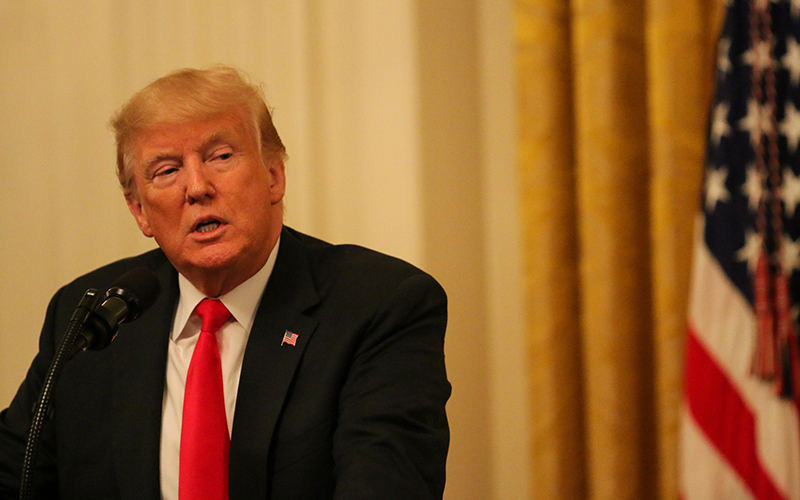
President Donald Trump said Friday that he never said soldiers should “shoot” migrants who throw rocks at authorities when he said a rock would be tantamount to using a firearm. He said Friday rock-throwers would be “arrested for a very long time.” (Photo by Alexis Egeland/Cronkite News)
WASHINGTON – President Donald Trump on Friday backed off his statement that active-duty soldiers on the border should respond to rock-throwing migrants as if the soldiers had been attacked with a firearm.
The president instead said that rock-throwing immigrants would be “arrested for a very long time” – even though the military is specifically prohibited from making arrests in connection with violation of domestic laws. Border Patrol or Immigration and Customs Enforcement officers would likely be on hand to make such arrests, he said.
“If our soldiers – or Border Patrol or ICE – are going to be hit in the face with rocks, we’re going to arrest those people,” Trump said Friday, according to a White House transcript. “That doesn’t mean shoot them. But we’re going to arrest those people quickly and for a long period of time.”
The comments came just one day after Trump said that any assault on a soldier – including throwing rocks – will be treated “the maximum that we can consider that” and that our “military fights back.”
“We’re not going to put up with that,” he said. “When people throw rocks like they did at the Mexico military and police, I say, consider it a rifle.”
When asked Thursday if that meant firing on migrants, Trump said “I hope not,” and Friday he clarified that, “I didn’t say ‘shoot,'” in his remarks a day earlier.
The comments cap a week in which Trump deployed 5,200 soldiers to the border to back up 2,000 National Guardsmen, who have been there since April backing up Border Patrol agents. The latest deployment of soldiers came in response to a caravan of Central American migrants headed north through Mexico.
Thousands of migrants who said they were fleeing poverty and violence in Guatemala and Honduras have been on the road for weeks, scuffling briefly with police at the Mexican border before entering that country and continuing the trek north, according to published reports.
The caravan grows and shrinks as people, many of them families with children, join or drop out. But it is still in far southern Mexico.
Trump has pointed to the scuffle with Mexican police, charged that the caravan includes criminals and said all the migrants are attempting to exploit U.S. asylum laws. As part of the military response, he said Thursday that soldiers would be erecting tent cities to hold immigrants indefinitely while they await trial.
Calls requesting comment from the Defense Department and from border agencies on the progress of the latest deployment were not immediately returned Friday.
Critics called the moves little more than political theater in the days before the election, noting that the law prevents active-duty soldiers from doing much of what Trump has threatened.
“He creates a fictitious crisis and then has to rhetorically up the ante in his response,” said Donald Kerwin, executive director of the Center for Migration Studies. “And then also the government has to totally contort itself to justify his original false rhetoric and premise which is that these people represent a threat. They don’t.”
University of Texas at El Paso Professor Josiah Heyman said Trump’s use of the military is nothing new, and that similar moves by past presidents have been motivated by political symbolism. But Heyman reiterated that U.S. law prevents the military from enforcing domestic law at the border or elsewhere.
“The point is that they’re not really doing a damn thing,” Heyman said.
As for the possible use of lethal force, Heyman said it is an option for Border Patrol agents – but only in limited circumstances.
“Border Patrol … is allowed to consider rocks as a potentially lethal force or seriously injurious force, and do use lethal force against rock-throwers,” Heyman said. “Essentially what the court cases require is that for lethal force to be used there needs to be a lethal risk in the understanding of a reasonable officer.”
Just as importantly, he said, Border Patrol agents have been trained in recent years to de-escalate conflicts – not something in the playbook of active-duty soldiers and National Guard troops being rushed into the field, whose training is centered on how to “apply absolute massive lethal force.”
“Active-duty military and National Guard … they’re not trained in civilian law enforcement use of lethal force, or less-than-lethal force for that matter,” Heyman said.
Follow us on Twitter.